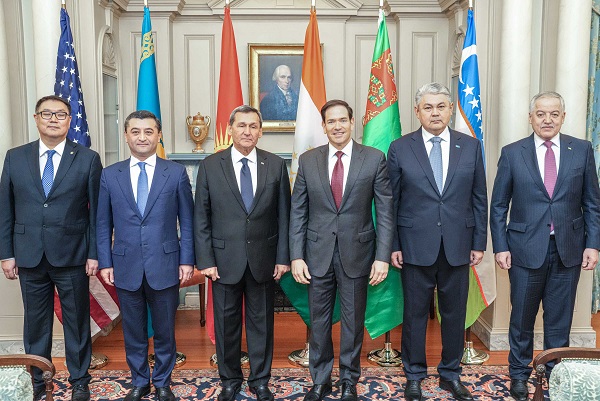U.S. Secretary of State Marco Rubio announced his intention to visit all five Central Asian countries in the coming year, signaling a renewed commitment to deepening ties with the region.
Speaking at a welcome reception hosted at the State Department on 5 November, Rubio addressed foreign ministers from Kazakhstan, Uzbekistan, Tajikistan, and Turkmenistan, along with the ambassador of the Kyrgyz Republic. The event, held in the Benjamin Franklin Room, set the stage for the high-level C5+1 summit scheduled for the following day, which will bring together the presidents of Kazakhstan, Kyrgyzstan, Tajikistan, Turkmenistan, Uzbekistan, and their U.S. counterpart, President Donald Trump.
” I personally intend to visit in the coming year as well, and I – all five, so I know it’d probably be a week-long or longer trip, so we’ve got to work on that and make that happen together,” Rubio said, emphasizing his dedication to engaging directly with each nation.
The remarks underscore the Trump administration’s foreign policy agenda, which Rubio described as prioritizing alignments of national interests between the U.S. and its partners. “I think one of the things that President Trump has made very clear is that he wants American foreign policy to be rooted, based on the national interest of the United States,” Rubio stated.
He highlighted convergences in economic development, where U.S. innovation and business expansion align with Central Asia’s goals of diversifying economies beyond natural resources.
“Ultimately that’s how foreign policy works. You have national interests; we have national interests. When does foreign policy work best? It works best when the national interest of two countries are aligned,” Rubio added.
He noted that while complete alignment on every issue isn’t necessary, but they’re aligned on important ones, including economic development.
From the U.S. perspective, Rubio explained, the USA is looking for opportunities for American innovation and American business and American products to expand to more markets and more places.
For Central Asian nations, this means leveraging their human capital and mineral wealth to build diverse sectors, moving beyond reliance on energy and raw materials. ” You don’t just want to be a source of energy or a source of minerals; you want to use that responsibly to build out other sectors of your – of your economies so that you provide long-term opportunities for your people and further develop,” he said.
The reception, introduced by Deputy Secretary of State Chris Landau and Senator Jim Risch, chair of the Senate Foreign Relations Committee, celebrated the unique occasion of convening Central Asian leaders under the C5+1 banner. Established in 2015, the dialogue format has evolved into a key platform for U.S. engagement with the region, promoting collective cooperation on security, trade, and connectivity.


